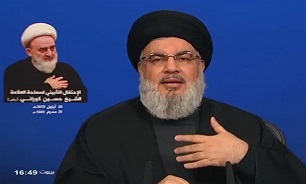 In an address to the Lebanese people in a televised speech broadcast live from the Lebanese capital city of Beirut on Friday, Seyed Hassan Nasrallah pointed to the highly disruptive drone attacks on Saudi Aramco petroleum and gas processing plants at Abqaiq and Khurais in the kingdom's Eastern Province, stating that the “ensuing development clearly showed how expensive is oil once compared to blood. Saudi warplanes continue to kill Yemeni children, but no concrete action is taken (to stop the onslaught).”
In an address to the Lebanese people in a televised speech broadcast live from the Lebanese capital city of Beirut on Friday, Seyed Hassan Nasrallah pointed to the highly disruptive drone attacks on Saudi Aramco petroleum and gas processing plants at Abqaiq and Khurais in the kingdom's Eastern Province, stating that the “ensuing development clearly showed how expensive is oil once compared to blood. Saudi warplanes continue to kill Yemeni children, but no concrete action is taken (to stop the onslaught).”
“Saudi Arabia is highly advised to stop the war on Yemen instead of seeking to purchase advanced air defense missile systems. All costly weapons purchased the United States cannot protect you from (Yemeni) drone attacks,” the Hezbollah secretary-general said, according to Press TV.
He then urged Saudi officials to work out an agreement with Iran, emphasizing that "military aggression on Iran will never be to the benefit of Saudi Arabia and the United Arab Emirates.”
“(US President Donald) Trump has commenced a new process of milking the Saudi kingdom. Trump is desperately seeking for a bilateral meeting with his Iranian counterpart Hassan Rouhani,” Nasrallah said.
He also strongly dismissed “unsubstantiated and malicious” allegations that Hezbollah plans to change the demographics in Syria, stressing that the Lebanese resistance movement has worked closely with the Damascus government to facilitate the repatriation of Syrian refugees.
Elsewhere in his remarks, Nasrallah described all those Lebanese nationals collaborating with the Israeli regime as “traitors,” noting that “they must be tried in accordance with their crimes.”
“Israeli collaborators must not be classified as 'forcibly deported' because they escaped to the occupied territories. Hezbollah distinguishes between the traitor and his innocent family members, who can return peacefully to their homeland. Neither Hezbollah nor the Free Patriotic Movement stipulates the return of the Israeli collaborators without any trial,” he said.
Nasrallah underlined that Hezbollah’s interception and targeting of Israeli drones curbed the Tel Aviv regime’s constant violation of the Lebanese airspace, emphasizing that the resistance movement reserves the right to confront Israeli unmanned aerial vehicles.
On September 9, Hezbollah announced that it had shot down an Israeli combat drone as it was flying in the skies over the southern border town of Ramyah.
The resistance group said it had successfully recovered the wreckage of the Israeli drone.
Nasrallah further referred to the recent Israeli elections and said, “Netanyahu tried to change equation in Lebanon in a bid to stay in power and continue on as incumbent Israeli prime minister. He even engaged in fiery rhetoric against Iran, but his bid to secure another term just failed”.
"Results of the recent Israeli elections exposed the extent of leadership crisis there, and showed the lack of confidence in the regime,” the Hezbollah chief said.
He noted that Netanyahu sought to exacerbate tensions in the Middle East in order to get elected.
Israel’s September 17 snap general elections came five months after an inconclusive vote in August, where Netanyahu once again failed to form a majority cabinet.
With 99 percent of the votes counted, Israeli media are saying that a Likud-led right-wing bloc looks set to control 55 of the parliament's 120 seats, with up to 57 for a center-left alliance.
Despite their rivalry, Netanyahu and his main opponent, Benny Gantz, had only narrow differences on key issues during their campaigns, meaning that even if Netanyahu was to stand down after five terms in office, significant changes in the Tel Aviv regime's policies on relations with the United States, the standoff with Iran or the Palestinian conflict would most likely remain unchanged.
Once all the votes are counted, Israeli President Reuven Rivlin will meet with the parties that won seats and will ultimately give one party leader up to 42 days to form a government.
The deadlock has turned the regime's former minister of military affairs Avigdor Lieberman, who is now head of the far-right Yisrael Beitenu party which has eight seats, to a key influence in the coalition-building process
Source:defapress

 In an address to the Lebanese people in a televised speech broadcast live from the Lebanese capital city of Beirut on Friday, Seyed Hassan Nasrallah pointed to the highly disruptive drone attacks on Saudi Aramco petroleum and gas processing plants at Abqaiq and Khurais in the kingdom's Eastern Province, stating that the “ensuing development clearly showed how expensive is oil once compared to blood. Saudi warplanes continue to kill Yemeni children, but no concrete action is taken (to stop the onslaught).”
In an address to the Lebanese people in a televised speech broadcast live from the Lebanese capital city of Beirut on Friday, Seyed Hassan Nasrallah pointed to the highly disruptive drone attacks on Saudi Aramco petroleum and gas processing plants at Abqaiq and Khurais in the kingdom's Eastern Province, stating that the “ensuing development clearly showed how expensive is oil once compared to blood. Saudi warplanes continue to kill Yemeni children, but no concrete action is taken (to stop the onslaught).”














